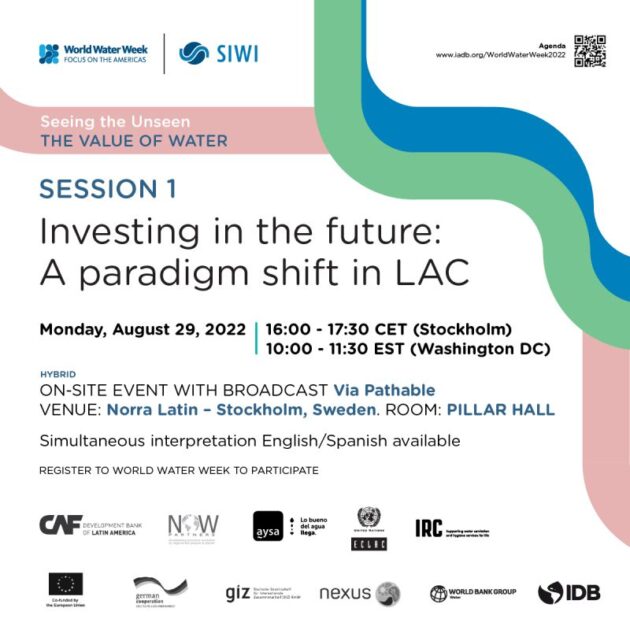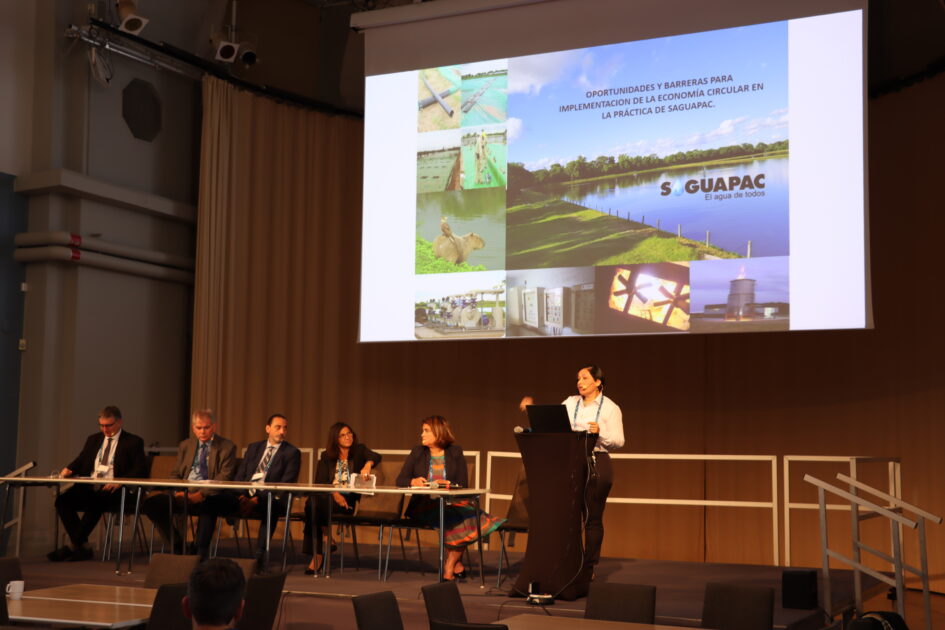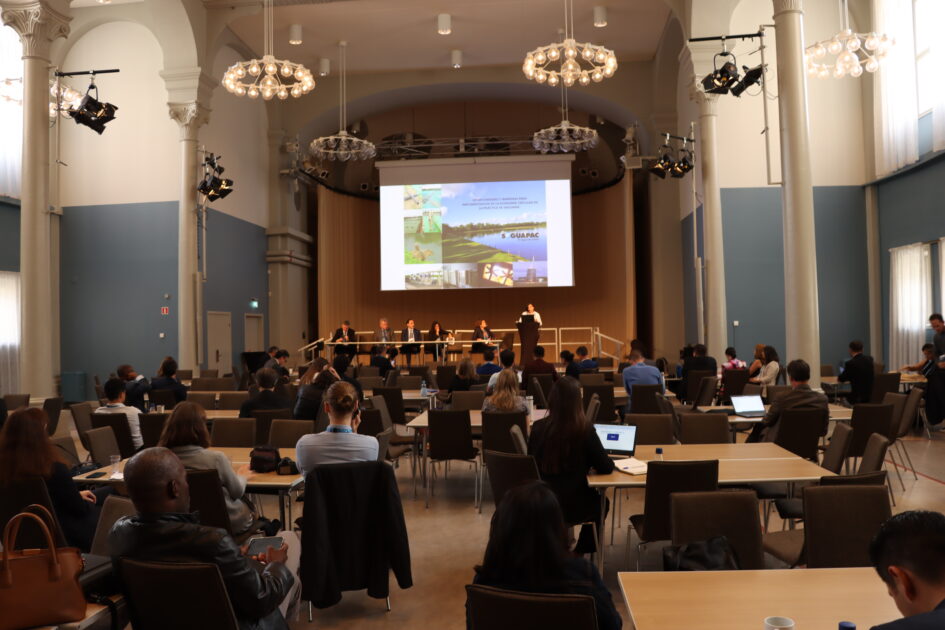SAGUAPAC participó en el World Water Week 2022 que se llevó a cabo en Estocolmo y donde se dieron cita personalidades, instituciones y empresas dedicadas a diferentes aspectos de la gestión del agua.

Se desarrollaron diferentes conferencias y conversatorios desde continentes que muestran que una nueva ruta es posible para lograr preservar el agua de calidad y cantidad para las generaciones futuras.
Fuimos parte de la sesión: “Invertir en el futuro, un cambio de paradigma en América Latina”. La sesión parte de la preocupación de la crisis climática y sus consecuencias en el estrés hídrico progresivo para regiones que ahora gozan aún de disponibilidad de agua. Se conversó sobre el camino a seguir para financiar e implementar a escala la nueva generación de plantas de tratamiento de aguas residuales desde la perspectiva de la economía circular donde las aguas residuales son un recurso económico valioso y los ecosistemas centrales para su desarrollo. Se presentaron casos prácticos en el sector que delinearon líneas a seguir para encarar las acciones futuras en América Latina.
SAGUAPAC expuso su experiencia sobre economía circular desde sus inicios hasta hoy, puntualizando las oportunidades y barreras para lograr los desafíos a futuro.
Explicando que las primeras plantas de tratamiento de aguas residuales de Bolivia fueron las de SAGUAPAC, mismas que fueron mejorándose de acuerdo a las necesidades de su funcionamiento y los adelantos técnico-tecnológicos a los que la cooperativa pone atención permanente. Así cada nueva planta de tratamiento se pone en operación con mejoras en relación a las anteriores.
En las plantas de tratamiento se realiza la obtención y quema de biogás, lo cual disminuyó las emisiones de carbono y también la incomodidad de los vecinos por los fuertes olores que había en la zona.

Uno de los desafíos, aún pendientes en este ámbito es la eficiencia energética, donde se tiene la última fase del proyecto, que consiste en generar energía a partir de las lagunas anaerobias de modo que las plantas de tratamiento funcionen con la misma energía generada en la planta.
SAGUAPAC tiene una cobertura del 69% en alcantarillado sanitario, y se tiene el desafío de atender la demanda de la totalidad del área de prestación de servicio. Por este motivo, se implementó una iniciativa piloto de gestión de lodos fecales domiciliarios en Santa Cruz[1] de la cual SAGUAPAC es parte operativa, la iniciativa resultó exitosa y se involucró a las autoridades Departamentales y locales, ONG’s, agencias de cooperación para apoyar en la legislación, regulaciones favorables y financiamiento económico para la continuidad del proyecto.
https://docs.google.com/document/d/11tuq0LTD75uXrlSAkOLOGyqcmcfFheMCXFeuHauZuNQ/edit?usp=sharing
World Water Week 2022
SAGUAPAC participated in the World Water Week 2022 in Stockholm and where personalities, institutions and companies dedicated to different aspects of water management met each other.
The days of the event vastly consisted insharing successful experiences and new ways of managing water in the world. In the event, the key points that must be reinforced were identified in order to achieve the proposed objectives.
Different conferences and talks were held from the continents, all them showing that a new route is possible to preserve water quality and quantity for future generations.
We were part of the session: “Investing in the future, a paradigm shift in Latin America”. The session starts from the concern of the climate crisis and its consequences in progressive water stress for regions that now still have water availability. The way forward to finance and implement at scale the new generation of wastewater treatment plants was discussed from the perspective of the circular economy where wastewater is a valuable economic resource and the central ecosystems for its development. Practical cases in the sector were presented that outlined lines to follow to face future actions in Latin America.
SAGUAPAC presented its experience on the circular economy from its beginnings until today, pointing out the opportunities and barriers overcome the challenges in the future.
It was explained that the first wastewater treatment plants in Bolivia were those of SAGUAPAC, which were improved according to the needs of their operation and the technical-technological advances to which the cooperative pays permanent attention. So, each new treatment plant is put into operation with improvements in relation to the previous ones.
In the treatment plants, biogas is obtained and burned, which reduced carbon emissions and also reduced the discomfort of the neighbors due to the strong odors that existed in the area.
One of the challenges still pending in this field is energy efficiency, and the last phase of the project is in progress, which consists of generating energy from the anaerobic lagoons so that the treatment plants work with the same energy generated in the plant.
SAGUAPAC has 69% coverage in sanitary sewerage, and it faces the challenge of meeting the demand of the entire service provision area. For this reason, a pilot initiative for the management of domestic fecal sludge was implemented in Santa Cruz, of which SAGUAPAC is an operational part, the initiative was successful and departmental and local authorities, NGOs, cooperation agencies were involved to support legislation, favorable regulations and economic financing for the continuity of the project.

[1] Para áreas que no tienen acceso a alcantarillado sanitario.
https://docs.google.com/document/d/1zk9Ks5nX8fu1pAuhWLLDoP4kta7hkwz7ybdHjm6rEKg/edit?usp=sharing
- CONVOCATORIA - 11 marzo, 2025
- Mantenimiento en Red de Agua Potable - 20 febrero, 2025
- Aviso de corte Uv. 20 - 18 febrero, 2025








